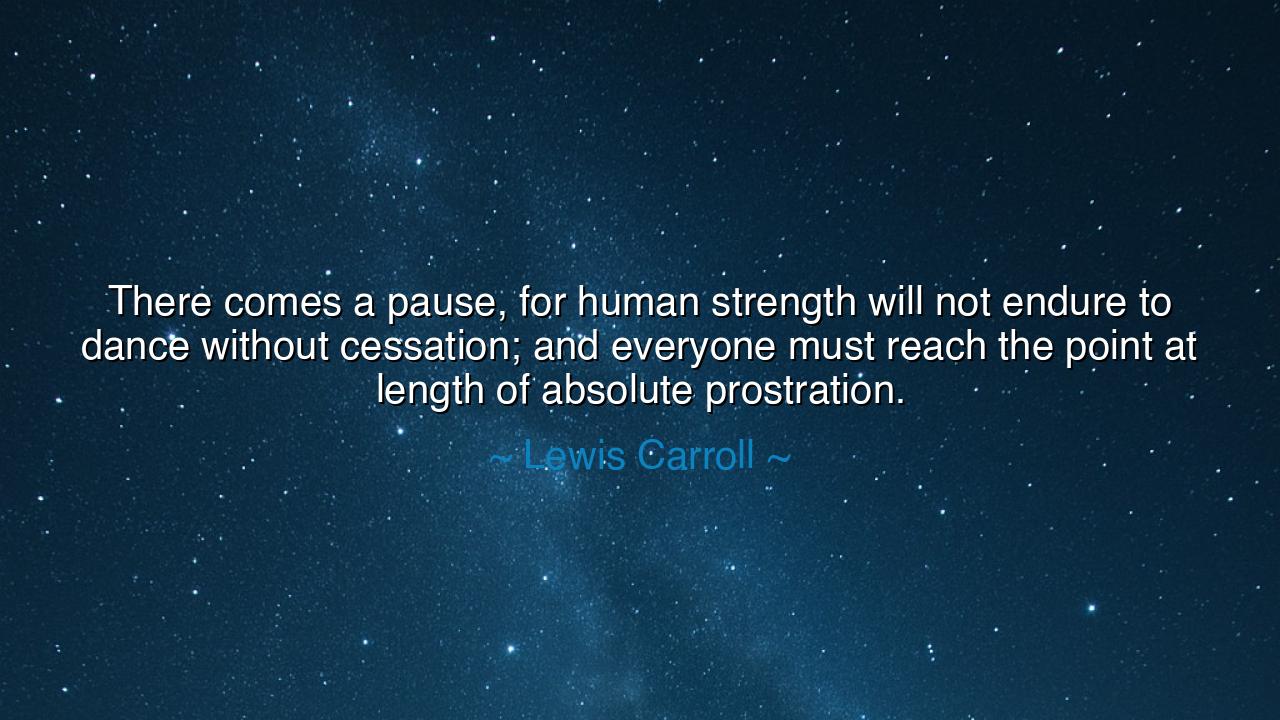
There comes a pause, for human strength will not endure to dance
There comes a pause, for human strength will not endure to dance without cessation; and everyone must reach the point at length of absolute prostration.






Lewis Carroll, the dreamer who clothed truth in wonder and wisdom in whimsy, once wrote: “There comes a pause, for human strength will not endure to dance without cessation; and everyone must reach the point at length of absolute prostration.” These words, though drawn from the playful world of Carroll’s imagination, speak with the gravity of eternal wisdom. For they remind us that even joy, even labor, even the brightest flame of human endeavor cannot burn forever without rest. Strength, though noble, has its limits, and those who ignore this truth will one day fall into the dust of exhaustion.
The meaning of this saying is both simple and profound. Carroll likens life to a dance—a rhythm of movement, effort, and delight. Yet no dancer, no matter how spirited, can whirl without end. The body falters, the breath shortens, the muscles collapse. Likewise, in the journey of life, there must come a pause, a stillness, a surrender to rest. To deny this truth is to invite ruin; to embrace it is to preserve both body and soul. His words are not an ode to weakness but a call to humility: to remember that we are finite, and that wisdom lies in honoring our limits.
The origin of this insight can be found in Carroll’s keen observation of human nature. Though famed for his tales of nonsense, he was a mathematician and a thinker, deeply aware of the laws of both logic and life. In his writings, he often concealed solemn truths within playful words. Here, behind the imagery of dancing, he delivers a sober reflection: all human endeavors, no matter how spirited, must meet the boundary of fatigue. Endless striving without rest leads not to triumph, but to prostration—the utter collapse of strength.
History testifies to this lesson. Consider Napoleon, who once boasted of his endurance and who pushed his armies beyond the point of reason. In the Russian winter, his men marched without pause, driven to exhaustion, and his empire crumbled not because of lack of bravery but because of the limits of human strength. Contrast this with leaders like George Washington, who knew when to retreat, when to pause, when to let his weary soldiers rest, and thus preserved them for the victories that followed. The wisdom to pause, to recognize exhaustion, has often meant the difference between ruin and survival.
The imagery Carroll uses is striking: the dance—a symbol of life’s activity, whether joyous or laborious—must at last come to stillness. No matter how noble the cause, no matter how passionate the pursuit, a man who never rests will collapse. It is a reminder to the proud, to the ambitious, and even to the joyful, that our strength is a gift, not an infinite well. Rest is not defeat, but renewal. To pause is not to abandon the dance, but to prepare for the next measure.
The lesson for us is vital: embrace the pause. Do not despise rest as weakness, but see it as wisdom. For in rest, the body is restored, the mind renewed, the spirit strengthened. Those who honor the rhythm of exertion and repose will endure far longer than those who burn themselves to ash. Even the mightiest must bow before the law of their own limits, but in bowing they rise again stronger.
Practically, this means building pauses into our lives—moments of quiet in the midst of labor, sabbaths of rest in the midst of striving, spaces of reflection in the midst of noise. It means recognizing the signs of exhaustion before collapse, and granting ourselves the gift of renewal. In doing so, we protect not only our own well-being, but also the causes and people we serve, for they need us strong, not broken.
So let Carroll’s words echo as timeless counsel: “There comes a pause, for human strength will not endure to dance without cessation.” Remember the rhythm of life—movement and stillness, exertion and repose, labor and renewal. Dance with all your heart, but when the time comes, pause without shame. For only in honoring the pause can the dance continue, not into collapse, but into greatness that endures.






AAdministratorAdministrator
Welcome, honored guests. Please leave a comment, we will respond soon